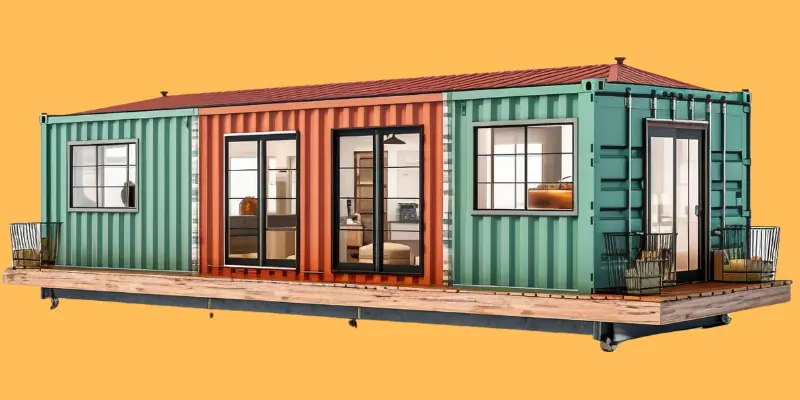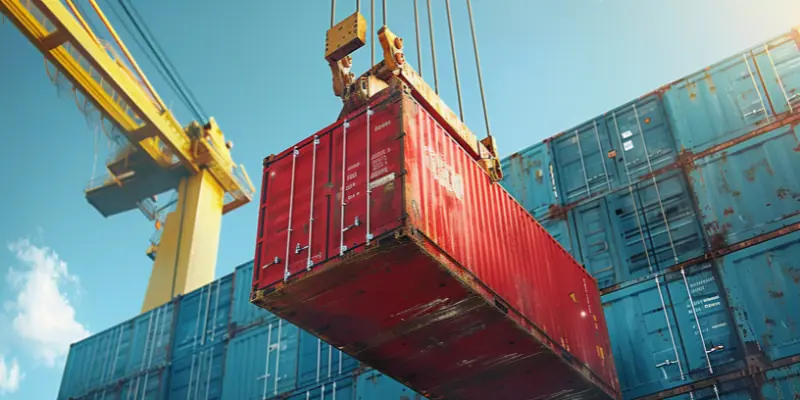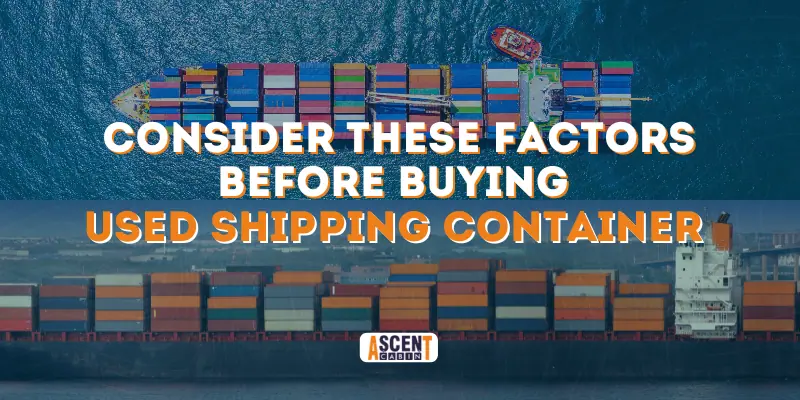Before you consider buying a used shipping container make sure to check these factors to save you time and budget.
It is better to be assured about what are your requirements beforehand. Here we will discuss potential factors to check before you make a choice of buying cargo container for your project.

1. Customization Potential
Check if the container is suitable for the customizations you want to make like adding windows, doors, interior sections areas, attaching kitchen & toilet, etc.
For example, if your purpose is to convert it to home you would need a proper security modification, if you are planning to convert shipping container into office use bright lightning and electric supply facility will be one of the main concerns.
Some suppliers offer premade containers with these features already added while it is easier to have a container in its original form for better customizations.
2. Container Material
Most shipping containers are made from Corten steel, which is strong and weather resistant. Corten steel can handle tough weather conditions, but you should still inspect the container for rust or damage, especially if it’s been used for many years.
3. Usage History
The number of times a container has been used affects its condition.
One-Trip Containers: These are the containers which have only had single trip and are in a great condition and are highly recommended for long-term usage.
Used Containers: They have been used multiple times and might have defects, but they are more affordable than one-trip containers. It is always important to inspect the container before purchase of any wear and tear.
4. Transportation Costs and Methods
Check if the delivery charges of the container, which may vary depending upon the size of the container and the distance to be travelled for delivery.
It is also important to check if any damage is made to the container while transporting who is responsible and what are your claims.
Shipping container price in India may vary depending on the container and the supplier, it is better to check at various places before buying.

5. Weight Capacity
Common usage of containers are shipping container home and used container office, both uses may require stacking the containers as per need. Ensure it can withstand the weight and future precautions to take since if stacking is not handled properly it can lead to massive damage and loss.
Important thing to consider: if the plan is to stack containers go for one trip container but, if your budget is tight go for used containers which are in good condition.
6. Weatherproof Coatings
If the installation location experiences heavy rainfall or near the coast, you should consider rust proofing the container to prevent corrosion. Either look for pre-coated containers or spent on anti-corrosion coating to extend life of a container.
7. Future Portability
Shipping containers comes with portability advantage, if you consider transporting it from one location to another keep minimal modifications as it will make the container heavy to transport increasing the future delivery charges.
Or have removeable modifications which will fulfil your current and future requirements.
Site Preparation and Location Considerations
8. Local Rules and Regulations
In some locations you might need permit to use a container as a home, office or any other space. Before installing container in your chosen location check with local authorities and governance laws and regulations.
9. Site Suitability
Make sure the site is not uneven, stable and dry to place the container. The container might get damaged or shift from its place if the site is uneven or flooding prone.
Proper precautions from saltwater to be taken if the site is near coastal area.
How to Choose the Right Supplier
10. Rent vs. Buy
Determine whether container requirement is of smaller span of time (less than 3 years) or longer.
Renting is better option for short period to save money where you will be using it for seasonal or temporary event whereas buying it is suitable for longer period.
If the usage will be of longer period and you are renting the container it will cost you more than buying.
11. Cost Comparison
Compare costs of different suppliers including their delivery charges and condition of the container.
Also consider comparing new and old shipping container prices to make a proper decision.
12. Supplier Support
A good supplier will provide after-sales support, warranties if applicable and support for any inconvenience occurring during the complete process.
Look for supplier who can answer your queries and help you select perfect shipping container that meets your requirement.
Where to Buy Used Shipping Containers
13. Local Dealers:
Buying from nearest supplier will reduce delivery costs and gives you more personalized service.
If you are looking for a supplier from Mumbai, Maharashtra consider contacting AscentCabin to get great service while purchasing used shipping container.
14. Individual Sellers:
Private sellers may provide containers that fits the budget but the container condition maybe questionable.
Always inspect the container in person or better go local dealer to avoid any future fraud from happening.
15. Reputable Suppliers:
These are companies that specialize in selling containers and are known for reliability. They offer warranties, support, and transparent pricing.
Post-Installation Considerations
16. Maintenance Tips
Once your container is installed, regular maintenance to keep it in good condition is mandatory. Common tasks include:
- Checking for rust stops and treating them as soon as possible.
- Ensuring doors and locks function properly to keep the security intact.
- Inspecting for any breaks and seals to keep the used container safe.
Premade vs. Used Containers
17. Premade Containers
If you have minimal modifications to make like adding windows, doors and locks you can go for premade containers. Since these features are added in them and will you time and hassle to make customizations.
Most of the time you can find premade containers which meet your needs, if your purpose is different from living in it like using it for storage or something else always ask the supplier if they have the one like you want.
18. Used Containers for Customization
If you prefer to have full control over the container design and modifications, buying a used shipping container is a better choice. Modify it as per your liking and requirements, whether it’s for home, office, storage, or making something else out of it.
Container Inspection Checklist
Having a checklist to inspect before buying an old container is helpful, use this checklist to ensure that the container meets the criteria:
- Water Damage: There may be chances the container has undergone harsh weather conditions leading to seal leaks and corrosion. Check it from inside and outside.
- Door Functionality: Look the locks hinges of the existing doors of the container if they are functioning properly if you plan to keep them.
- Seals and Locks: Make sure the locks are secure and free from wear and tear like large damages, holes and rust.
- Corrosion Treatment: Ask the supplier if the container has been treated for rust or will it need it in the future.
Additional Considerations for Buyers
19. Container Sizes
Shipping container dimensions vary but the the standard sizes are 20ft and 40ft. Choose the size that will complete your requirement, going for a larger container when you work needs a smaller one will make you waste your time and money on it.
Be assured of what size of container you want to save budget and time in modifications.
20. Intended Use
Make sure the container fits your specific purpose. For example, a cargo-worthy container is best for international shipping, while a wind-and-water-tight container is suitable for general storage.
If you are planning to use this container to build home consider reading this guide about building shipping container home to not miss out on great tips.
21. Security and Features
Look for the security features you will be installing in the container, like locks, bars, or motion-sensor lights if the purpose is to use it a home, office or any living space.
If you plan to add security and features such as cameras, roofing, security locks and more ask the supplier beforehand if the container can be modified with these features before you but it.
22. Site Preparation
The location where container will be placed if is not properly levelled you may have make changes like adding concrete base or foundation to support the container weight avoiding it from slipping and damage.
Check with the local authorities if the changes are allowed or not to have smooth installation process and avoid future conflicts.
Conclusion
We discussed 22 factors to consider before buying used shipping container for any project. From site preparation to post installation and finding best cargo container supplier we discussed everything to help you make an informed decision to save costs and have a hassle-free buying process.


